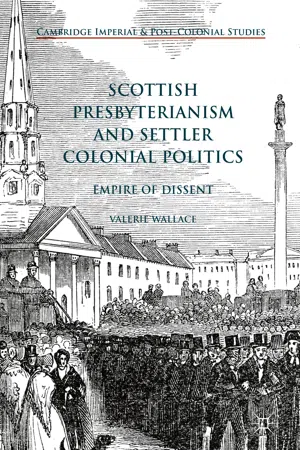In the nineteenth century around two million people left Scotland to begin new lives in the colonies of Britain’s empire.1 They left for many reasons. In the depression of the post-Napoleonic era, government-sponsored emigration schemes encouraged the dispossessed and disenfranchised to seek their fortunes abroad. Skilled tradesmen from the Scottish lowlands travelled to Canada ; in 1820 around 4000 Britons, of which about ten percent were Scots, went to the Cape Colony in southern Africa ; in later years thousands more would go to New South Wales and New Zealand .2 Distinctive regions of Scottish settlement evolved where the exported customs of Scotland endured. In Scotland the dominant faith was Presbyterian, and in the Anglican world of Britain’s empire communities of Scottish Presbyterians sought to institute their own churches and maintain their own forms of worship.3 They sent requests home for religious ministers to come and join them. Hundreds of missionaries from the established Church of Scotland and the branches of the dissenting churches—the Secession , the Relief Church , the Reformed Presbyterian Church and later the Free Church —answered these calls.4
Among those who left Scotland in the first decades of the nineteenth century were the five individuals with whom this book is chiefly concerned. The Rev. Thomas McCulloch (1776–1843), a missionary from the Secession church who was born near Paisley , settled in Pictou , Nova Scotia in 1803. Thomas Pringle (1789–1834), a lay member of the Secession and a poet from the Borders , sailed for the Cape Colony in 1820. William Lyon Mackenzie (1795–1861), another member of the Secession and a journalist from Dundee , left for Upper Canada in the same year. The Rev. John Dunmore Lang (1799–1878), an evangelical Church of Scotland minister born near Greenock , arrived in Sydney in 1823. Samuel McDonald Martin (1805?–1848), a journalist from the Isle of Skye , admirer of the Free Church and the brother of a minister, went to Sydney in 1837. He later moved to Auckland in 1842.
Before their respective migrations, these five Scotsmen had never met. But their experiences as settlers in Britain’s empire were strikingly similar and would bring their lives together. Inspired by ideas and rhetoric drawn from their Presbyterian heritage, McCulloch , Pringle , Lang , Mackenzie and Martin all complained about Anglican privilege in the colonies: the Church of England ’s official, or de facto, position as the established church in the empire, its control of land reserves, its grip on education and its monopoly of political power. These colonists all utilised the newspaper press to voice their grievances and they lobbied government to bring about political change. They became acquainted with each other’s work and, in the case of a few, met each other in person. This book weaves together for the first time the stories of McCulloch , Pringle , Mackenzie , Lang and Martin , five demonstrably important but under-researched reformers, uncovering their connection to a Scottish Empire of Dissent. It describes how, though settled in far-flung territories of Britain’s empire, the lives of these five migrants, and the reform campaigns they led, came to be intertwined.
This book considers the political role in early nineteenth-century colonial societies of some of the smaller and less well-known, but nevertheless influential, Scottish Presbyterian dissenting churches. It has less to say about the major Presbyterian denomination in Scotland—the national Church of Scotland . The established churches in Britain, particularly the United Church of England and Ireland , have received more attention from historians of colonialism than their dissenting rivals. God’s Empire (2011) by Hilary Carey examines how the Church of England and the Church of Scotland , as well as some other religious institutions, promoted imperial loyalty in settler communities and helped to foster the idea of a globalised ‘Greater Britain’.5 The Church of England , other scholars have agreed, played an important role in forging an expanded and integrated Anglophone settler world.6
But the attempt to establish the Church of England as the church of the empire also generated an enormous amount of protest. Nonconformist and dissenting churches, as well as some troublesome elements within Anglicanism, sometimes acted as conductors of disruptive ideas and fostered only conditional loyalty in pluralist settler societies. Networks of religious dissenters and interaction between dissenters and reforming politicians—particularly on issues like slavery abolition and humanitarian ‘protection’ of indigenous peoples —facilitated challenges to colonial governance at ‘home’ and ‘abroad’.7
The Scottish Presbyterian dissenting churches with which McCulloch , Pringle , Mackenzie , Lang and Martin were all affiliated had a reputation for political subversion. These five migrants—two of whom were clergymen and three of whom were lay members—transmitted the disruptive ideas propagated by these churches and they were not the only ones to do so. Indeed, there were thousands of migrants who belonged to these churches—the Secession , the Relief and the Free Church —whose adherents constituted about one-third of the Scottish lowland population.8 The Secession was one of the first churches in Scotland to send missionaries to colonial settlements in North America ; these missionaries encountered little competition from other preachers and became culturally influential.9 The Free Church , which propagated similar values as the Secession , would be similarly influential on a new generation of migrants in the years after the great schism of 1843 .10 Yet there are few histories of the Scottish dissenting churches in the British empire—the Secession and Relief churches were entirely omitted from Carey ’s book—and there has been very little written about their influence on colonial politics.
The Politics of Dissent
What was the tradition of political subversion to which McCulloch , Pringle , Lang , Mackenzie and Martin were so indebted? Dissenters in Scotland —‘Conditional Britons’, to use Colin Kidd ’s evocative label11—had a reputation for stirring up trouble. The revolution settlement of 1690 established Presbyterianism rather than episcopacy—r...
